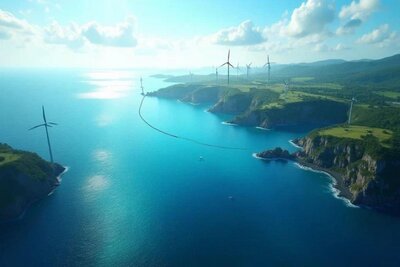04.10.25
Azerbaijan plans to implement four international “green energy” corridors to export electricity generated from renewable green energy sources (RES). According to the government, the first of these corridors will be launched between 2026 and 2027.
The Azerbaijani government’s press service stated: “The feasibility study for the first ‘green energy’ corridor has been completed. It will stretch from the Nakhchivan Autonomous Republic (NAR) to Turkey. The planned transmission line will also be able to deliver electricity generated from renewable sources in the neighboring Karabakh economic region and Eastern Zangezur to eastern regions of Turkey. Its capacity will reach up to 1 GW.”
Currently, work is underway to lay connection lines between Nakhchivan and neighboring regions of Azerbaijan, to construct the energy cable toward Turkey, and to define the export volume, buyers, and energy-supplying facilities. At present, renewable green energy sources account for over 45% of Turkey’s energy balance, with hydropower making up the largest share. By 2035, Turkey aims to generate more than 120 GW of energy from renewable sources.
The initiative to import 1 GW of “green energy” from Azerbaijan to Turkey is part of the two brother countries’ joint energy strategy. This strategy aims to utilize the potential of renewable sources (130 GW onshore and 160 GW offshore), develop new energy partnerships, and test the export model of Azerbaijani energy through the “Nakhchivan–Turkey” line.
The renewable green energy potential of the Nakhchivan Autonomous Republic is estimated at about 6 GW, including solar, wind, and geothermal resources. Of the exported 1 GW, 760 MW will come from solar plants and 240 MW from wind plants. Major solar plants in Nakhchivan will start operation in 2026, and wind plants in 2027.
In addition, the government’s press service announced plans to construct another “green energy” corridor through Turkey, extending by land to Bulgaria. It should be noted that Bulgaria is also a participant in the third and largest “green energy” corridor — the “Caspian–Azerbaijan–Georgia–Black Sea” route originating from Azerbaijan.
The fourth “green energy” corridor will run from Central Asia across the Caspian Sea to Azerbaijan. Its commercial feasibility study will be carried out between 2026 and 2027.
Overall, Azerbaijan plans to export 4 GW of renewable energy by 2040. Currently, the open joint-stock company “Azerenergy” and China’s “China Energy” company are researching technological methods for storing and exporting “green energy.”
As a result of these projects, Azerbaijan will play a key role in supplying renewable green energy and in transiting Central Asian energy to Turkey and Europe. These initiatives aim to achieve economic and environmental goals, promote technological development, and create new jobs in the participating countries.







